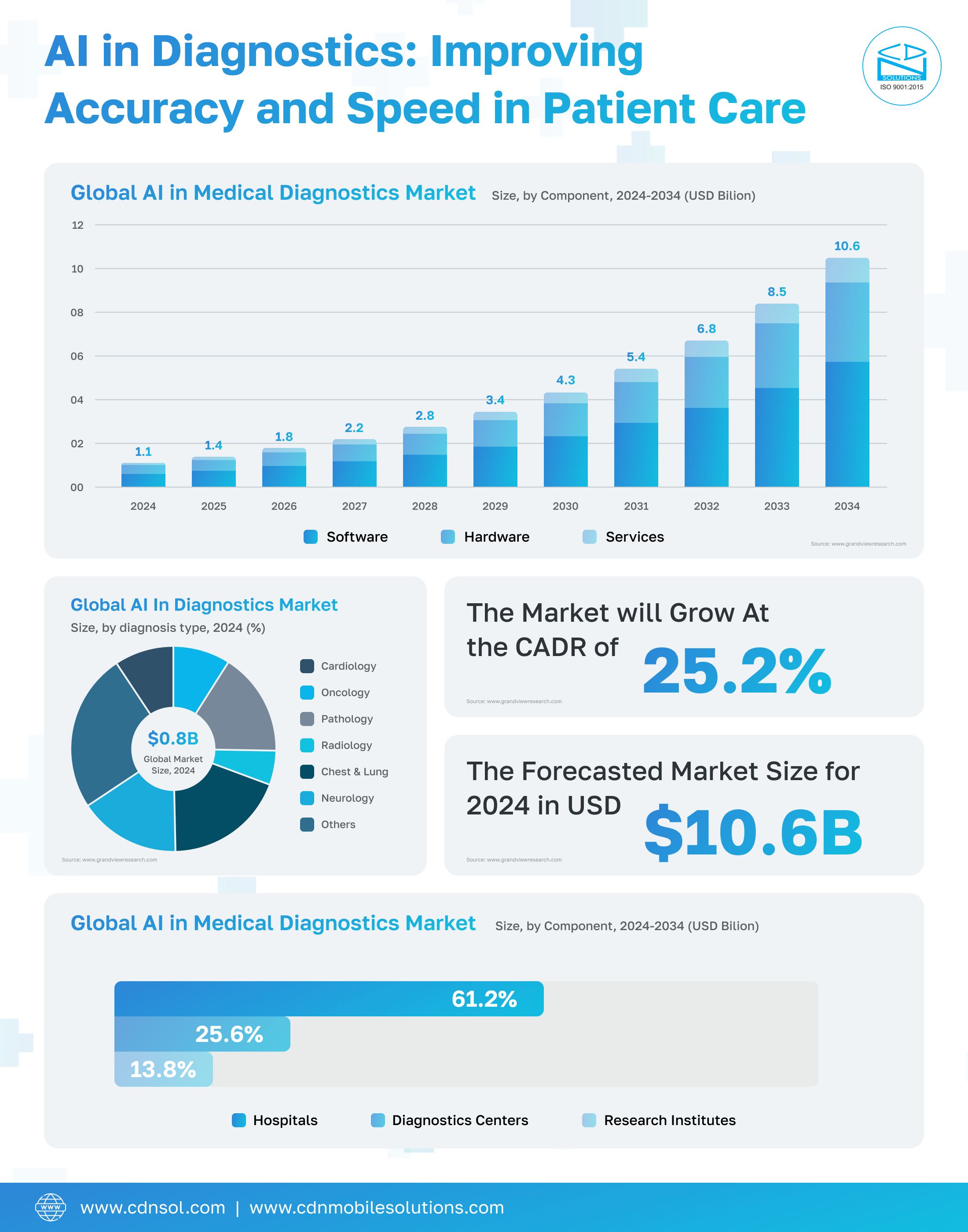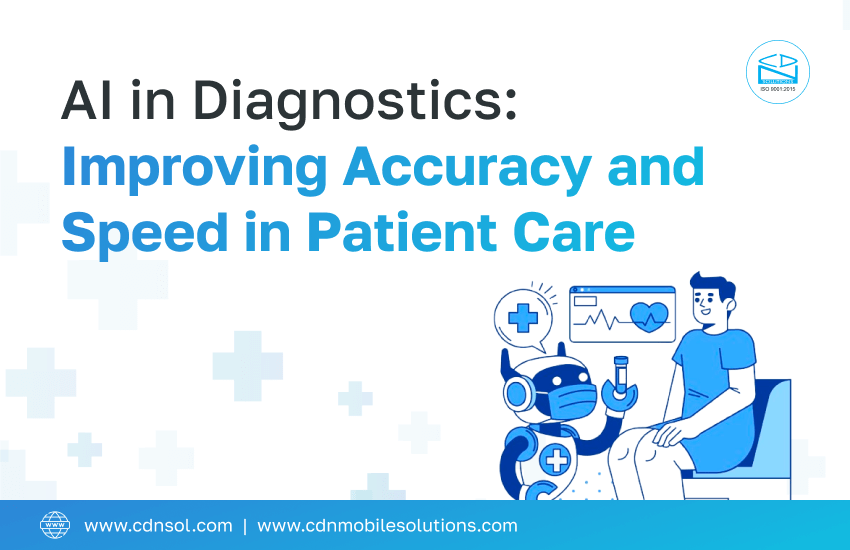Artificial Intelligence is a game-changer in the world of medicine and diagnostics. We discussed it in the previous blog as well. In this article, we will be discussing areas that are considered the primary focus where AI improves diagnostics- accuracy, speed, and preciseness also presents challenges and future possibilities of AI in diagnostics.
AI can analyze huge volumes of data in real-time; hence, AI-powered diagnostics is fast-changing precision and efficiency in patient care. From advanced imaging to predictive diagnostics, AI accelerates and improves medical diagnosis for better health outcomes.
AI diagnostics involves using machine learning algorithms and deep learning techniques in studying medical data, such as imaging scans, pathology slides, and genetic information. AI systems can identify patterns and anomalies that may be easily skipped over by the human eye. Therefore, with AI applied to diagnostic capabilities, more functions and applications open in the field of medication.
Table of Contents
Use cases of AI in Diagnostics
AI has become very important in the medical field for early diagnosis, to reduce human errors, and for more effective treatment planning. AI-enabled medical diagnosis software allows healthcare professionals to make evidence-based decisions that increase the accuracy and personalization of care.
AI and Imaging Technologies
Among the major fields of application of AI in diagnostics, medical imaging technologies are leading. AI medical diagnosis systems perform well in analyzing complex imaging data obtained in MRI scans, computed tomography, X-rays, and ultrasound images. The big dataset-trained machine learning models support the identification of abnormalities in the imaging scans much faster and more accurately than usual, hence earlier and more precise diagnosis. For example, AI medical diagnosis apps find their usual applications in radiology to enable early detection of cancer, cardiovascular diseases, and neurological disorders.
Examples of AI in Medical Diagnosis Imaging:
- Detection of early signs of breast cancer from mammograms with high accuracy.
- Stratification of stroke risk from brain scans using deep learning algorithms.
- Lung diseases and COVID-19 diagnosis by AI-based chest X-ray analysis.
AI in Pathology and Laboratory Testing
AI is also finding its place in pathology and laboratory testing departments. Several tissue samples can be analyzed through AI using machine learning medical diagnosis models, recognizing abnormal cells with much more precision. AI can aid pathologists in identifying complex conditions such as cancer by scanning thousands of slides for patterns much faster. AI is also being worked upon to automate routine tests through laboratories, which would significantly cut down on human errors and ensure consistency in test results.
AI-Powered Real-time Diagnostics
Now, diagnosis or treatment in real-time is becoming possible with the help of AI-powered tools. This is much needed in urgent care situations when every second counts. AI has completely changed this game by processing data almost in real time, thus helping healthcare professionals to make quicker and wiser decisions. AI-powered wearable health gadgets can continuously monitor heart rate, oxygen levels, or glucose and send out alerts in real-time upon detecting some abnormality. That could significantly reduce response times in life-critical situations and reduce mortality rates.
Some of the Key Applications of Real-time AI Diagnosis:
- Continuous Monitoring of Cardiac Health and Early Detection of Arrhythmias.
- Real-time glucose monitoring reduces the risk of complications in diabetic patients.
- Immediately alerting abnormal vital signs during surgery.
AI in Predictive Diagnostics
AI, since dealing with huge data analysis, plays a huge role in predictive diagnostics. The machine learning medical diagnosis system takes into account the study of patient history, genetic data, and environmental factors to make predictions on the chances of contracting certain conditions. For example, AI can predict chronic diseases such as diabetes, cardiovascular diseases, and even some forms of cancer, which can be prevented before the actual symptoms set in. Predictive diagnosis helps health professionals come up with personalized treatment programs based on particular individual risk factors, hence enhancing quality patient care.
Accelerating Diagnosis with the Aid of AI
Diagnostic processes mediated through AI have become manifestations of quintessential time reduction in medical diagnosis. Traditional approaches to diagnosis may involve a rather complex multitier process with extended waiting for results. On the other hand, AI diagnosis software is in position and capable of processing and analyzing such data in minutes or even seconds, hence reducing the diagnostic timeline to a minimum. This acceleration is particularly valuable in emergency rooms and critical care, where quick decision-making is essential.
How AI Accelerates Diagnosis:
- Imaging and test results by AI algorithms are done at a speed much faster than that of human experts.
- The wait times for pathology and lab results are cut short by AI tools.
- AI speeds up decision-making in the critical care environment.

AI and Diagnostic Accuracy
Diagnostic accuracy is one of the sensitive areas, and AI seems to turn out to be a strong companion in the area of diagnostic errors. Although human error in diagnosis can be of grave consequence, AI-enhanced capability for minute detail detection, sometimes not visible to the naked human eye, and recognition of patterns that may have escaped human expertise significantly contributes to higher diagnostic accuracy. In the case of radiology, for instance, AI-driven tools outperform human radiologists in selected tasks, such as early-stage detection of lung cancer. Likewise, AI intervention in dermatology, ophthalmology, and cardiology also contributes to higher diagnostic precision.
Examples of AI Improving Diagnostic Accuracy:
- Detection of melanoma from skin images more precisely than by traditional means.
- Detection of diabetic retinopathy in eye scans more accurately.
- Identifying subtle abnormalities in ECG readings and thereby predicting heart conditions well in advance.
Ethical and Regulatory Challenges in AI Diagnostics
While AI offers great improvements in diagnostic precision and speed, it is not without raising several ethical and regulatory challenges. Privacy and security in patient AI systems are a huge concern. More importantly, AI systems require oodles of personal health data for training. This may go ahead and replicate bias if the AI algorithms are trained on non-representative datasets. This necessitates the establishment of regulatory frameworks that ensure the safety, transparency, and efficacy of AI diagnostics, among others, including discussions of accountability when AI systems misdiagnose.
Principal Ethical and Regulatory Challenges:
- Privacy and security of patient data within the AI medical diagnosis systems.
- Algorithmic biases in healthcare AI tools.
- Strict regulations on the application of AI for diagnostic purposes in medicine.
The Future of AI in Diagnostics
The future of AI in diagnosis is bright. While these algorithms are getting better and better, the potential for even more accurate, faster, and personalized diagnostic systems is immense. Further revolutionary changes in diagnostic methodologies would emerge with new technologies like AI-driven genomics, robotics, and nanotechnology, among others. It would allow for holistic patient monitoring, predictive diagnostics, and personalized medicine, whereby AI is integrated with other technologies such as IoT and big data. This creates the promise of a future in which health conditions can be detected and treated even before they have fully manifested.
Future of AI in Diagnostics:
- Integration with IoT for continuous real-time health monitoring.
- AI-driven genomics for personalized medicines and targeted treatments.
- More accurate, faster, and predictive diagnostic systems.
Also read: The Impact of AI in Healthcare: Transforming Patient Care and Operational Efficiency
Conclusion
AI diagnostics will irrevocably revolutionize the health world with advanced precision, speed, and pinpointed patient’ care. From the use of AI-enhanced imaging technologies to predictive diagnostics and real-time monitoring, AI is bound to continue making great strides in reducing diagnostic errors, hence improving patient outcomes while streamlining healthcare operations. But with such advancement comes significant ethical and regulatory issues that need to be looked into for the safe and appropriate implementation of AI in medical diagnosis. The future holds immense promise as AI continues to evolve and reshape the landscape of diagnostics toward better, faster, and more personalized healthcare solutions.
Next article will investigate The Role of AI in Personalized Medicine: Customizing Treatment for Better Outcomes

